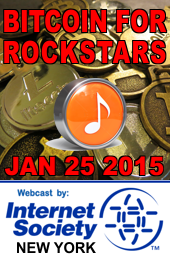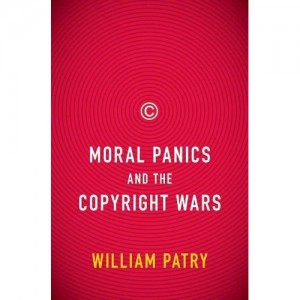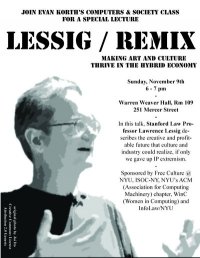 On Sunday 25 January 2015, at 4pm the Internet Society’s New York Chapter(ISOC-NY) will present “Bitcoin for Rockstars – a fireside chat with D.A. Wallach” at TurnToTech NYC. The traditional existing methods of registering works and distributing music royalties are archaic, arcane, inefficient, and unsuited to the global networked marketplace. D.A. Wallach recently proposed thata decentralized, open, global ledger, based on bitcoin style blockchain technology, as an optimal solution for credits and rights information about music. Then a system of “smart contracts” could facilitate the distribution of funds. Thus:
On Sunday 25 January 2015, at 4pm the Internet Society’s New York Chapter(ISOC-NY) will present “Bitcoin for Rockstars – a fireside chat with D.A. Wallach” at TurnToTech NYC. The traditional existing methods of registering works and distributing music royalties are archaic, arcane, inefficient, and unsuited to the global networked marketplace. D.A. Wallach recently proposed thata decentralized, open, global ledger, based on bitcoin style blockchain technology, as an optimal solution for credits and rights information about music. Then a system of “smart contracts” could facilitate the distribution of funds. Thus:
In the proposed music rights network, each song, recording, rights-holder, creator, and payor would have its own unique address on the ledger. And complimenting this ledger would be “smart contracts,” programmatic rules defining how the addresses relate to each other and automating their interactions. For example, Katy Perry’s “Dark Horse” would have its own address, as would Katy Perry herself, each of her collaborators, and each of the companies entitled to royalties from the song. One set of “smart contracts” could connect all of these addresses to one another.
Spotify, YouTube and other services could then issue all-in royalty micro-payments (aggregating all negotiated fees) directly to the “Dark Horse” address every time the song is played. The smart contracts connected to the “Dark Horse” address would recognize the source of the payment—say, Spotify—and then instantly split and redirect royalties to all the addresses entitled to payments from the service for the song. Katy Perry, her label, her publisher, and her collaborators would all have total visibility into payments received by the “Dark Horse” address, and each would receive its shares instantly in its own wallet. This software-based relay station for royalty and licensing payments would put creators at the center of the action, allowing them to understand how much money their works were generating, and from which services or licensees. It would also give artists and songwriters instant access to the funds generated by their work, obviating the long waiting periods they currently endure.
We invite you, on a Sunday afternoon, to join D.A. Wallach and ISOC-NY to explore this fascinating concept! Our interlocutor will be Aram Sinnreich of Rutgers University. Please RSVP via ISOC-NY’s meetup.
What: Bitcoin for Rockstars – a fireside chat with D.A. Wallach
Where: TurnToTech, 184 5th Ave, 4th Floor, NYC (@22nd St)
When: Sunday January 25 2014 – 4pm-6pm | 2100-2300 UTC
Webcast: https://new.livestream.com/internetsociety/bitcoinforrockstars
Register: http://www.meetup.com/isoc-ny/events/219873421/
Twitter: #bitcoinforrockstars





 ISOC-NY is a co-sponsor of Evan Korth’s Computers & Society speaker series at NYU this fall. The next talk is this Sunday. It will feature Professor Lawrence Lessig of Stanford University. His topic is “Remix: Making Art and Commerce Thrive in the Hybrid Economy.â€
ISOC-NY is a co-sponsor of Evan Korth’s Computers & Society speaker series at NYU this fall. The next talk is this Sunday. It will feature Professor Lawrence Lessig of Stanford University. His topic is “Remix: Making Art and Commerce Thrive in the Hybrid Economy.â€